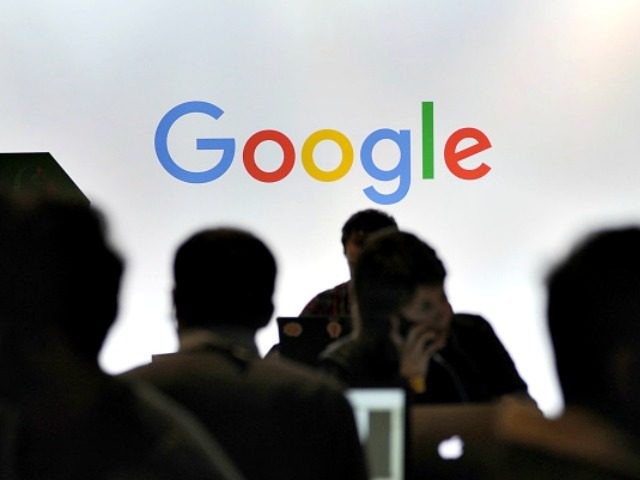When President Trump was still on the campaign trail, he noted that Amazon is using the Washington Post (owned by Amazon) as a political instrument to avoid prosecution for its “huge antitrust problem.” President Trump is right to be concerned about Silicon Valley’s unprecedented corporate power and influence over the nation’s media, and he’s right that “we can’t let [them] get away with it.” But the greatest threat to our constitutional republic isn’t Amazon. It’s Google.
Google’s anticompetitive use of its monopoly power is beyond doubt. A Federal Trade Commission staff report found that Google has intentionally engaged in discriminatory conduct that has strengthened its monopoly power and caused “real harm to consumers and to innovation” that “will have lasting negative effects on consumer welfare.” While the European Union is still conducting serious antitrust investigations into Google’s abuse of its monopoly power, the U.S. closed its investigation of Google after giving it little more than a slap on the wrist.
In its investigative report of the closed FTC investigation, the Wall Street Journal noted that an antitrust lawsuit against Google would have pitted the Obama administration against one of its closest corporate allies, who “was the second-largest corporate source of campaign donations to President Barack Obama’s re-election effort.” This awkward situation could explain why the Obama administration gave Google a corporate pass, but it’s not the only possibility.
Google’s practice of censoring ideas and suppressing conservative viewpoints offers an equally powerful rationale for the Google “boosterism” by both the Obama administration and the Democratic Party generally. Though the Federal Trade Commission’s findings focused on commercial speech overwhelming evidence exists that Google manipulates its search results for ideological reasons as well — to suppress conservative thought and support progressive causes. This is likely only the tip of the iceberg. Tech-left leader Eric Schmidt, Google’s Chairman, openly admits that search engines can “detect malicious, misleading and incorrect information [as defined by the left] and essentially have you not see it.… just take it off the page… right?… Put it somewhere else. Make it harder to find.” For Democrats, prosecuting Google would be akin to biting the hand that feeds them.
Most conservatives have been complicit in ignoring the competitive and consumer harms that Google’s monopoly abuses have caused, let alone the threat Google poses to conservative ideals and Republican political candidates. Researchers have shown that Google can use its search results to influence voter behavior and, at least in theory, determine the outcome of political elections. The results of five double-blind, randomized controlled experiments published by the Proceedings of the National Academy of Sciences in a peer-reviewed paper demonstrated that “biased search rankings can shift the voting preferences of undecided voters by 20 percent or more” with voters showing “no awareness of the manipulation.” The paper’s results suggest that a dominant search engine, like Google’s, “has the power to influence the results of a substantial number of elections with impunity.”
Google’s power to influence the media goes well beyond its search engine. Google’s DoubleClick service dominates the ad server market. DoubleClick serves ads to 75 percent of all websites that use ad servers. Google serves ads to the vast majority of digital newspaper and local television websites through relationships with entities like the Local Media Consortium, Gannett, and the New York Times. Because newspapers rely heavily on advertising revenue, Google’s control over digital advertising gives Google control over journalism’s primary revenue stream. As Gannet, the publisher of USA Today and scores of other newspapers around the globe, noted in its 2016 Annual Report, its local advertising service could be adversely affected by “any new developments or rumors of developments regarding Google’s business practices that affect the local online advertising industry.”
Way back in 1999, the founders of DoubleClick recognized the danger of assembling numerous publications into a single advertising network — that it could become more powerful than the media and ad agencies for whom it works. They dismissed the problem by asserting that they would never compete with their clients in content. “That’s just a line” that shouldn’t have been crossed. But thanks to lax antitrust enforcement, Google crossed that line when it to acquired DoubleClick in 2008 and AdMob in 2010.
The late professor Ben Bagdikian, a prominent media critic, wrote that “media power is political power,” especially power over newspapers, which “have a unique social function that their media competitors do not.” Bagdikian was concerned that consolidation of the media into a handful of major conglomerates would alter the politics of the country. He believed that advertisers financial power had given them the keys to content. But even he couldn’t predict that the keys to twenty-first-century ideas would be owned by just one key master — Google.
Despite its enormity, Google’s power to stamp out conservative ideas is not inevitable. The antitrust laws offer a remedy. Trump should undo Google’s acquisitions of DoubleClick and AdMob by breaking up Google. The future of conservatism, a free press, and our fundamental liberties depends on it.
Fred Campbell is Director of Tech Knowledge, a free market think tank, an adjunct professor of communications law at the Nebraska College of Law and former Chief of the Federal Communications Commission’s wireless bureau.

COMMENTS
Please let us know if you're having issues with commenting.